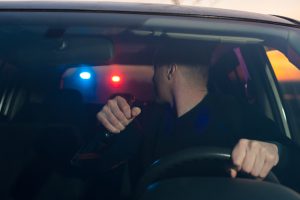
Drug dogs are being used more and more in Maryland when the police suspect there may be illegal drugs in the car. Police can stop vehicles for minor traffic violations and if they don’t have probable cause to search the vehicle, they may request that a K-9 unit respond to the scene to conduct a dog sniff. Below we explain the law and reasoning behind this law enforcement tactic and what you should know if you are stopped and your car is sniffed by a drug detection dog. We will answer the question: “Is it Legal for a Drug Dog to Sniff Search My Car During a Routine Traffic Stop?”
BACKGROUND FOR USE OF DRUG DOGS IN ROUTINE TRAFFIC STOPS
In 2005, the United States determined in Illinois v. Caballes that it is legal to use a drug-sniffing dog during a routine traffic stop so long that it does not unreasonably delay the stop. This case rested on whether allowing the use of a drug-sniffing dog during a routine traffic stop violated the Fourth amendment or not.
In the Illinois case, Illinois State Trooper Gillette conducted a routine traffic stop after he observed Caballes speeding. State Trooper Graham overheard the reported traffic stop and responded to the scene immediately with his drug dog. Graham proceeded to walk his dog around Caballes’s car and the dog alerted to drugs in the trunk. The officers then searched Caballes’s trunk and found marijuana.
Caballes was arrested and convicted. He was fined $256,136 and sentenced to twelve years in prison. Caballes tried to suppress the evidence found in his trunk, but the trial judge denied his motion. The case then made its way up to the Supreme Court where the court had to determine whether the use of a drug-sniffing dog during a routine traffic stop was a violation of a person’s Constitutional rights. Specifically, whether the Fourth Amendment’s Search and Seizure Clause requires a police officer to have reasonable articulable suspicion to use a drug dog during a routine traffic stop.
ARE THE USE OF DRUG DOGS DURING A ROUTINE TRAFFIC STOP LEGAL?
The Fourth Amendment was enacted to protect one’s privacy. Whether a search or seizure is reasonable it determined by balancing the intrusion of one’s rights versus the legitimate government interests in conducing that intrusion, such as public safety.
Further, the Fourth Amendment requires that law enforcement officers obtain a warrant prior to conducting most searches and seizures. This requirement applies in most scenarios, however there are a few exceptions. These exceptions include: consent searches, motor vehicle searches, plain view doctrine, exigent circumstances and border searches.
If an government official does not obtain a warrant or one of the above exceptions does not apply, then the evidence found without these tools should be suppressed at trial.
WHEN CAN POLICE OFFICERS USE A DRUG DOG DURING A ROUTINE TRAFFIC STOP?
For a police officer to legally pull a car over, they must have a reasonable suspicion that the driver has violated a traffic law. Once the officer has this reasonable suspicion, they are legally able to conduct a routine traffic stop. Once the traffic stop transpires, this action is considered a seizure. A seizure is considered to occur when a reasonable person would not feel free to leave.
Relating the above stated law to Illinois v. Caballes, one can conclude that the traffic stop was a legal one. This is due to the fact that it is stipulated that Caballes was speeding before getting pulled over. Once the officer observed Caballes speeding, he was lawful to pull the car over. Therefore, the traffic stop was lawful and a seizure was justified.
It then had to be determined whether the original traffic stop and seizure were reasonable, and whether the seizure became unjustified once they kept Caballes for an unreasonably prolonged duration. The Court rejected this argument as they found that the traffic stop was only ten minutes and therefore was not prolonged for an unreasonable delay.
WHEN CAN A POLICE OFFICER NOT USE A DRUG DOG DURING A TRAFFIC STOP?
A drug dog sniff search does become illegal when the use of the drug dog unreasonably extends the traffic stop because this would constitute as a violation of the Fourth Amendment. The Court in Illinois reasoned this conclusion by explaining that “conducting such a dog sniff does not change the character of a traffic stop that is lawful at its inception and otherwise executed in a reasonable manner.” The ultimate reasoning for why the dog sniff search in Illinois v. Caballes did not violate the fourth amendment is because the dog sniff search did not unreasonably prolong the length of the traffic stop.
CONCLUSION FOR DRUG DOG SNIFFS
In conclusion, it is legal for a police officer to conduct a drug dog sniff search during a routine traffic stop. This is due to the fact that once a driver violates a traffic law, an officer is lawful to pull that car over and conduct a seizure of that car. As long as the drug dog sniff does not prolong the routine traffic stop for an unreasonable amount of time, the sniff is legal. If the sniff does prolong the traffic stop for an unreasonable amount of time, then the dog sniff is no longer legal or constitutional. Whether the sniff prolonged the traffic stop an unreasonable amount of time is discretionary and decided on a fact by fact basis.
MARYLAND DRUG DEFENSE LAWYER
If you’ve been stopped and your vehicle search and ultimately charged with a crime, you need an experienced criminal defense lawyer working to protect your rights. A lawyer can argue this case and many other others to prevent evidence from being admitted into evidence. If you have been charged with a crime in Maryland, contact the Law Offices of Randolph Rice today to schedule a free consultation and discuss your rights.